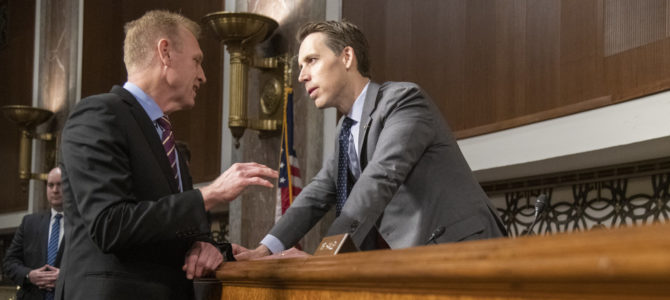
The United States needs to push hard to open back up, with states taking the lead, Sen. Josh Hawley told The Federalist in a Tuesday interview, saying, “It probably will be a decision the states make state by state because states are going to vary, and what’s good for New York is not what we’re going to need in Springfield, Missouri, for instance, so you’ve got to let the data be the guide there.”
America, he added, has to take a long hard look at our global economy and its vulnerabilities: “We’d be nuts to have suffered through this crisis, suffered through the vulnerabilities in our medical supply chain and our broader economy that this has exposed, and do nothing about it.”
“It’s vitally important that we get the whole country open back up as soon as we possibly can,” Hawley said, “And I can just say here in Missouri people want to do their part, they are doing their part, the streets are empty ,the schools are closed, the shops are closed, but nobody likes this. Americans don’t like not working, they don’t like not going to school… They want to go back to work. Over and over and over people ask me when they can get back to work, when are we going to be able to get back to school … We have got to be pushing hard toward breaking the back of the epidemic and getting to a sustainable place where we can open back up, not only for peoples’ psychologies, not just to support family life, though those things are hugely vital, but also we’re seeing incidents of hunger.”
Hunger, he said, is already a major problem for a lot of Americans. The Republican senator had just finished a phone call with “the director of a major international relief charity,” he said, who told him, “the claims from families for meals are unlike anything he’s ever seen in his whole career and it’s nationwide, and he was telling me they have had desperate pleas for help from churches in 43 states who said ‘We cannot feed the parishioners who come to us who say they are out of work, ‘I maybe haven’t got my unemployment check, I haven’t gotten any relief payments yet and I’ve got to feed my children.” So those are real things that are happening all across the country.”
Based on information from public health officials, we’re not going to have a widely available vaccine for 10-12 months, Hawley predicted, “but what I think we cannot do is just say, ‘Well, we’ll just remain on lockdown for a year.’ I mean, that is just not going to work, we can’t do that, it will end up being a humanitarian crisis and nobody wants to do that. So we’ve got to figure out as way for as soon as practical to start opening back up and mitigating the risk.”
The young conservative unveiled a stage IV stimulus plan in a Wednesday op-ed, seeming to disregard Republicans’ blocked attempt to add money to stage III’s rapidly draining Paycheck Protection Plan as making “a few fixes to existing programs and [hoping] for the best,” and proposing in its stead that Washington “cover 80 percent of wages for workers at any U.S. business, up to the national median wage, until this emergency is over. Further, it should offer businesses a bonus for rehiring workers laid off over the past month.”
“America,” he wrote, “is experiencing a moment of crisis, but it need not be a period of decline.”
Much of the plan as outlined, however, focuses on workers — a mainstay of Hawley’s populist, working-class conservative political philosophy — with payroll tax rebates and investment credits as “the most direct way to help businesses.” American entrepreneurs, while eager to take care of their employees, are also trying to stay in business at all, and a number have complained that a tax credit at the end of the year won’t mean much if they’re out of business.
“If you believe in strong but limited government you don’t want to create a bunch of new programs, you don’t want to do what Democrats say they want to do, which is enact their social agenda, their Green New Deal agenda… I don’t want to create new agencies that will last forever,” Hawley said. “What we need to do is something that is decisive and quick and that addresses the problem, which is people losing their jobs and businesses going out of business.”
There will be another round of legislating in response to the coronavirus disaster, he told The Federalist: “I think that there will be a phase IV no matter what, the question is what’s going to be in it, and I think that phase IV has got to focus on employment… I think that the tsunami of unemployment claims that we are seeing is the leading indicator of the kind of severe economic stress that our country’s in.”
Businesses “just can’t sustain themselves on 10 percent of their revenue flow so they’re just shuttered, and the question is how long can they sustain that without completely going under.”
“The government has shut down much of the economy to deal with this pandemic… The government must be the insurer of last resort here. We are the one shutting them down,” he noted.
“I think the severity of our situation is beginning to dawn on people,” he added. “I don’t think anyone expected that it would be this severe this quickly: I mean nobody. Economists didn’t say ‘Oh we’re going to have 17 million unemployment claims in three weeks.’ I mean, who thought that would happen: nobody. But here we are, so we have a responsibility to act.”
“Bottom line,” he concluded, “is we’d be nuts to have suffered through this crisis, suffered through the vulnerabilities in our medical supply chain and our broader economy that this has exposed, and do nothing about it. That would be crazy. It would be a real failure of leadership, I think, so the time is now to begin looking to the future and thinking about how do we make our own economy stronger, our own workers more secure, our own health security more stable going forward.”








